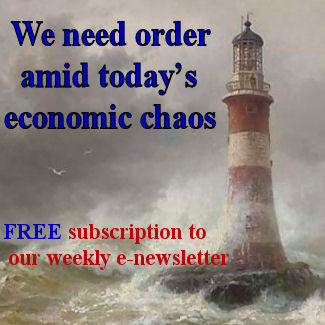 It’s Not an Exact Science; That’s Why Other Factors Must Be Considered, Says Socio-economics Scholar.
It’s Not an Exact Science; That’s Why Other Factors Must Be Considered, Says Socio-economics Scholar.
The crux of the 2008 economic collapse was the abstract and unnatural repackaging and sale of subprime mortgages, which were sold on the false premise of being valued products. The world learned the hard way that these were toxic assets but we are now running the risk of suffering the same hardship again, says scholar John Horvat II, a sought-after researcher and scholar.
“The economic gymnastics involved in the collapse distracts many from the essential nature of what happened five years ago: sectors of our economy are frenzied and out of balance,” says Horvat, author of Return to Order (www.returntoorder.org).
We need to address this issue, he says. Our economy is suffering from a systemic problem Horvat calls frenetic intemperance: a restless, reckless spirit that infects sectors of the modern economy and foments a drive to throw off legitimate restraints and gratify all desires.
Horvat proposes an organic solution.
“Many of us believe this problem needs to be looked at from the bottom up, which is why we propose an organic society as a part of the solution to an economic problem,” he says. “We believe that when economic activities take place inside the context of society, it allows the natural restraining influence of human institutions such as customs, morals, family and community to calm markets and prevent frenetic intemperance.”
Horvat says the above factors constitute the “heart and soul” of the economy, which may be revived in the following ways:
• Focus on property: Before becoming a modern commodity, private property possessed a strong intangible value. Real property, especially land, was a point of anchorage or sanctuary from which a family might develop. Wherever a strong sense of private property exists, a strong family pervades, and the family may persist there for many generations. In such cases, land and property become embedded in social relationships. They are not mere commodities; rather, they’re part of the social and political organization itself, conferring the intangible qualities of honor, authority and status upon the owner.
• Social capital: There is now a field of sociological studies focusing on the value of what is called “social capital” in the economy. It’s a social fabric of human relationships that serves as a kind of capital since it creates conditions for trust. Although unquantifiable, it enriches and lubricates social, civic and economic life, giving it undeniable value. It’s also a source of immense security and trust – something that was lost for many after the subprime mortgage crisis.
• The “invisible” economy: Beyond individual relationships, there are also those human institutions which cannot be undervalued if we’re to have a healthy, organic economy. These are also innately nuanced and unpredictable. Institutions like the family and community serve as essential braking mechanisms inside an economy that prevent frenetic intemperance. In this sense, economic developments and transactions share space with other human endeavors, including literature, the arts and education. Such institutions serve the purpose of creating psychological health and stability and should not be seen as mere nostalgic musings. This “invisible” economy, a reinforced social infrastructure, in no way denies the need or importance of a formal economy. Rather, think of both as intertwined; each provides rigor, vitality and trust in the other.
About John Horvat II
 John Horvat II is a scholar, researcher, educator, international speaker and author “Return to Order.” His writings have appeared worldwide, including The Wall Street Journal, FOX News, The Christian Post, The Washington Times, ABC News and C-SPAN. For more than two decades he has been researching and writing about the socio-economic crisis in the United States.
John Horvat II is a scholar, researcher, educator, international speaker and author “Return to Order.” His writings have appeared worldwide, including The Wall Street Journal, FOX News, The Christian Post, The Washington Times, ABC News and C-SPAN. For more than two decades he has been researching and writing about the socio-economic crisis in the United States.


